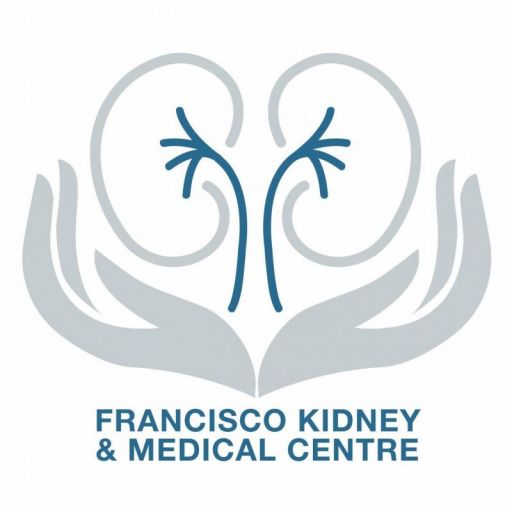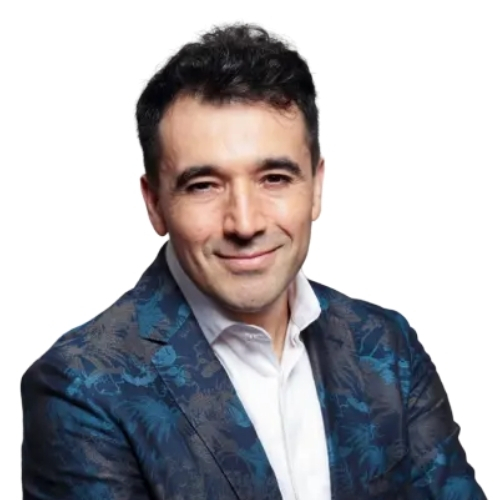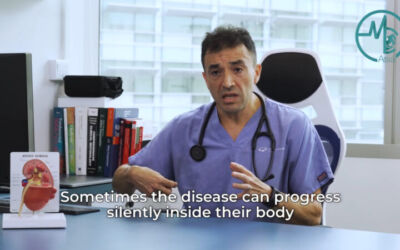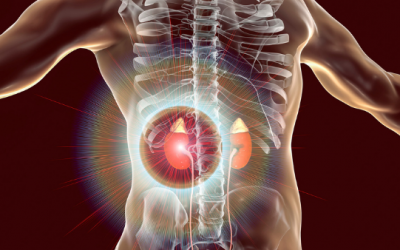Are diabetes and kidney failure a big problem?
Diabetes is very common. In fact, it is the most common cause of kidney failure worldwide and in Singapore. So, it is not a benign disease, that if not managed and controlled well; silently or overtly, can cause many complications, not only to the kidney.
Diabetes affects primordially the blood vessels and the circulation of many bodily organs.
Persistent high blood levels of sugar (poor diabetic control) progressively damages many organs of the body which are rich in blood vessels like the heart, eyes, brain and kidneys, and affect the circulation to the limbs or male genitals.
The nerves in many regions of the body are commonly affected, too.
Simplistically, the excess of blood sugar kind of “caramelises” inside the blood vessels and tissues and that causes inflammation, damage and scarring.
Around 40% of patients with diabetes develop kidney problems, what some people call diabetic nephropathy or diabetic kidney disease.
Specifically, in the kidney, high blood sugar progressively damages the microfilters of the kidneys (or glomeruli, the ones that clean the blood), and patients start leaking proteins in the urine.
If poor sugar control remains, it can lead to progressive scarring of the microfilmers of the kidneys, losing their capacity to clean the blood and control body water, with consequent elevation of blood creatinine (which is a marker of kidney disease); elevation of toxins in the blood; and fluid retention, too.
Thus, kidney dysfunction and proteinuria are the main manifestations of diabetic kidney disease. But you do not need to wait to have them before you can do something about it.
In addition, the damage of the small blood vessels of the kidney, leads to poor flow to many important parts of the kidneys, contributing to the progressive deterioration of kidney function, and eventual scarring of the kidneys.
Unfortunately but a big reality is that many patients develop total kidney failure from diabetes, needing dialysis or a kidney transplant to remain alive.
On top of diabetes affecting many bodily organs, when the patients develop advanced kidney disease or total kidney failure, the damage caused by the toxins is added to the damage caused by diabetes itself, and the likelihood of complications increases dramatically.
Many patients become very susceptible to heart attacks, strokes and many disabilities, which can significantly affect the length and quality of life of the patients who suffer them.
In Francisco Kidney & Medical Centre, we not only treat kidney problems but the main source of it, which is type 2 diabetes mellitus. But what is more important is we focus on the prevention of diabetes and prevention of its complications rather than only treating complications or acting when there is an obvious problem.
What is the clue to control diabetes better or prevent it?
We’ve discussed that diabetic kidney disease is a big and significant problem that we need to address at different levels in order to prevent more people from having the disease and for them to suffer from a constellation of complications.
This can sound scary… and actually, it is.
Yes, it does not happen to all patients, especially if diabetes is detected early, and the condition is managed well by the doctor and the patient. So, that should be the focus, early detection and early and continuous intervention.
Frankly speaking, the patient suffering diabetes or at risk of diabetes plays the main role as diet and lifestyle modifications are the mainstay of the treatment of diabetes, in patients without medications or in those needing them.
Because of the implications of diabetes at so many levels, I have declared a war against diabetes, and I have chosen prevention or early intervention as my strategic approach.
As mentioned, diabetes is the most common cause of kidney failure. In turn, being overweight is probably the most important factor involved in the genesis of type 2 diabetes.
Thus, if we can help people to remain healthy, to control sugar intake and to lose weight if they have excess weight, then we can modify the outlook; especially when the patient has pre-diabetes or diabetes; or neither of them… but is at risk (eg excess of weight, heavy family history),… so, we can minimise the number of patients developing diabetes, and minimise the chances of disease progression if they have it, and destroy this bad chain from excess weight, pre-diabetes, diabetes to kidney failure (and other complications).
So, to do something about it, I started my own programme, the OLYMPIA Lifestyle Health Enhancement & Weight Loss Programmes actually destined for everyone with excess weight aiming to be healthy, but the people who are using my services are mainly middle-aged men and women with excess weight and risk factors for diabetes, heart disease or kidney problems or who maybe already have pre-diabetes or diabetes, who actually got a little bit of a fright from any of this news (their body giving them some warnings) and put their future life into the perspective of doing something now and change the future or keep the same and likely meet disease, complications or worse; but who also understand that it is an active process behind it.
But some people are just visionary and do not need to touch or almost touch bottom.
My patients and clients are losing weight, improving their vitality, reducing their disease risks and they are likely on the path to living a longer and happier life.
Prevention is certainly better than cure, but many patients just wait until they have symptoms or a complication and many doctors just focus their effort on treating the current disease and complications instead on going to the root cause which in many instances is an unhealthy diet and a sedentary lifestyle, but because those realms are not traditionally the territory of the doctors as medicine is taught, they delegate and relegate them to other professionals, but when actually, doctors are in the best position to recommend and intervene early in a healthy or healthy-ish patient rather than later.
Overall, better blood sugar control to prevent the appearance and/or the progression of diabetic kidney disease is crucial, even in patients with total kidney failure. This also helps minimise the risk of other complications like blindness and amputations; certainly, it will protect the heart and can reduce blood cholesterol and uric acid.
Never is too late to improve sugar control. It could prevent the occurrence of diabetic kidney disease, or slow its progression or minimise the impact it has on a patient’s health. And that will protect your kidneys; and you can obtain better protection if controlling it together with other problems like high blood pressure, excess weight, high cholesterol, high uric acid, etc.
In another article on kidney care, I discuss other things we doctors give or you can do to protect your kidneys better. For instance, the so-called “renin-angiotensin-aldosterone blockade”, and occasionally and if necessary advise on a diet low in protein and salt, and recommend avoidance of bad habits like smoking. Just read it for a more complete list of my recommendations to protect your kidneys.
Diet plays a crucial role in the management of diabetic patients to obtain better sugar control, even if taking medications. Medications are necessary for many patients with diabetes, but they are not a substitute for diet control: they are complementary. But many patients think that by taking medications their diet does not need to be controlled.
On the contrary, medications will work better if eating a healthier diet; and in fact, many patients can control their diabetes with diet only.
Many patients find it difficult to control their diet, as indeed diet and eating are pleasures and social activities, but with good support and advice from doctors and dieticians, it is possible to adopt a healthier diet and improve blood sugar control.
And even this can be achieved without excessive restrictions, with a personalised diet; in order to foster the sustainability of the diet regimen and of the blood sugar control.
And that is what I do in Francisco Kidney & Medical Centre and in my other company OLYMPIA Lifestyle by Dr Francisco. If you are having problems controlling your weight, your sugar, your diabetes and you want to protect your kidneys and your overall self (including your heart) so to live longer and better with less disease risk or complications…you can let me know if you need my help. Prevention is always better than cure; and that is my focus…and even more, in a personalised way.
What can you do to take better control of your diabetes?
In the previous articles, we discussed how significant or problematic diabetic kidney disease and diabetes are or can be. And I pointed that the centre of the solution lies in self-care; having as a basic diet and lifestyle changes, and not relying solely on medications. Importantly, many people can be treated solely with diet control.
 And it is the ‘not controlling the diet’ the main factor involved in disease appearance, disease progression and potential complications.
And it is the ‘not controlling the diet’ the main factor involved in disease appearance, disease progression and potential complications.
So, a healthier diet and lifestyle can not only help you treat diabetes better and prevent complications but if implemented early in people at risk, can avoid the development of diabetes.
It seems not simple for many to integrate diet changes, but it is also not impossible. I did it when I thought I couldn’t and ended up losing 10 kg and sustain it for 3 years already (at the time of writing this article); definitively improving my body shape and composition, but importantly minimising my risk for metabolic chronic illness like type 2 diabetes and enhancing my possibilities of living longer and better. I am not only the doctor who knows what to advise but the doctor who walks the talk.
In my clinic, we are proud to help patients to include sustainable and doable changes in their diet; impacting significantly their condition, because he provides the right advice, support and strategies…strategies that anyone can do…as long as…decide to do an active change and have the commitment to introduce new changes in their diet and lifestyle.
OK, let’s discuss some tips (not all of them on diet) I have for you to manage your diabetes better or your overall health when you have diabetes; with a special focus on type 2 diabetes.
1. If you are overweight or heavier than that, aim to lose weight through diet improvements and regular exercise.
2. Do at least light to moderate exercise if no heart problems (consult first your doctor as many patients with diabetes can have hidden heart problems) several days a week.
3. Reduce fried, fatty, oily food (reduce saturated fats, especially, and trans-fats, definitively)
4. If you have high blood cholesterol, you might need anti-cholesterol medications and to be more strict in your diet/
5. If you smoke…sincerely, stop smoking. It is not easy, ask for help if having difficulties, there are many methods to help you to quit smoking
6. Reduce sugary food and sugary drinks; and reduce the excess of carbohydrates, especially simple carbohydrates.
7. Take your anti-diabetes medications as prescribed by your doctor to target the right level of blood HbA1C (consult your doctor regarding which level is the right for you and try to achieve it).
8. Avoid very salty food, especially if you have high blood pressure.
9. Aim to have a blood pressure of at least <140/90 mmHg (the target can vary among patients and doctors’ preferences; so, talk to your doctor).
10. Buy a blood pressure machine to monitor your blood pressure at home and ask your doctor how to use it. This is very useful for you and your doctor…It is an extra cost, but see it as an important investment in your health.
11. Get your kidney function checked and test for leakage of protein in the urine, as diabetes can affect your kidney without you noticing it.
12. If leakage of protein is detected in your urine, ask your doctor if you should/could be on anti-proteinuric medications, as they can protect your kidneys, but some patients might have contraindications and cannot use them.
13. Many patients with high cardiac risk factors can benefit from taking aspirin, so ask your doctor if this is suitable for you; not everyone can take aspirin
14. Ask your doctor if you need some vitamin supplements.
15. See an eye doctor to examine the back of your eye (retina) yearly or earlier if changes in your eyesight occur. This is important to prevent eyesight deterioration and potential blindness.
16. Get your feet checked yearly by a podiatrist or specialist, but you can check your feet (by yourself) daily for any new lesion, redness, broken skin, splinters, swelling, blisters or pus; or ask your partner or children if you cannot reach it yourself. And avoid tight shoes, avoid walking barefoot even at home, test the temperature of the water before putting your feet in it, change socks daily, avoid scratching your skin, do not cut the cuticles as you can introduce infections.
17. It is advisable you have yearly influenza vaccination. Pneumococcal vaccination as well if it is not up to date. Hepatitis B vaccination is advisable: consult your doctor.
18. Follow all the necessary precautions recommended by international and local health advisory boards on COVID 19, for your own protection and the protection of the community in general. They can vary from country to country, so be attentive to that. Overall, practice respiratory etiquette and wear a face mask when in public and especially if you are ill with flu-like symptoms; but if you are ill, better see a doctor and/or stay at home. Even if you are not ill, stay at home if you don’t need to commute or be outside, and avoid large crowds, keeping the physical distance at your best capacity. Eat healthily and maintain yourself active (eg do exercise outdoors -if allowed- or at home). If you smoke, stop smoking. Control your diabetes as best as possible and any other medical conditions that you might have. Lose weight if you have excess weight. And remember to stay vigilant, stay safe and stay healthy.
19. Have your teeth checked by a dentist also as dental and gum problems/infections are common in diabetes.
20. Regarding alcohol, if possible avoid it, otherwise, do not binge-drink and avoid drinking in excess.
21. Inform your doctor immediately after becoming pregnant as you might need to discontinue medications like anti-cholesterol and anti-proteinuric medications.
22. Go back to consult your doctor if you have queries or worries about your health or side effects of therapies or recommendations or you do not respond as both expected to the strategy proposed by your doctor.
In Francisco Kidney & Medical Centre and in my other company OLYMPIA Lifestyle by Dr Francisco we focus a lot on disease prevention or prevention of its complications, health promotion, good metabolic control and health enhancement as a whole.
If you are having problems controlling your weight, your sugar, your diabetes and you want to protect your kidneys and your overall self (including your heart) so to live longer and better with less disease risk or complications…you can let me know if you need my help. Prevention is always better than cure; and that is my focus…and even more, in a personalised way.
I am Dr Francisco, wishing you the best possible health.





